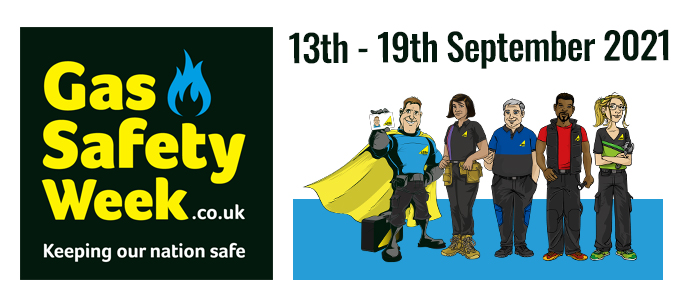
With this year’s Gas Safety Week underway, it’s more vital than ever to ensure we all undertake the necessary precautions and procedures to keep our colleagues and customers safe.
Running from the 13th - 19th September, the annual event—coordinated by the Gas Safety Register—has been raising awareness of the life-saving importance of gas safety since 2010.
Now, more than a decade later, that same message remains crucial. As always, we’re proud to throw our support behind the campaign and will continue to play our own part in ensuring our industry puts safety above all else.
Why do we support Gas Safety Week?
Carbon monoxide poisoning affects more than 1,000 people every year, and more than 5.5 million homes in the UK are known to have unsafe gas appliances.
When it comes to gas safety, negligence can lead to fatal circumstances.
Not only do we want to ensure everyone is fully aware of the threats posed by unsafe gas work, we truly value the Gas Safety Register’s essential role in holding those carrying out illegal and dangerous work accountable.
The importance of Gas Safe Registration
By law, all gas engineers must be on the Gas Safe Register. This certification is crucial in the prevention of unsafe work and is the quickest and most reliable way for customers to know whether an engineer is fit to carry out work.
Useful gas safety tips
Below, we’ve included the official guidance anyone can follow to ensure they’re remaining gas safe, courtesy of the Gas Safe Register:
- Only use a Gas Safe registered engineer to fit, fix and service your appliances. You can find and check an engineer at GasSafeRegister.co.uk or call 0800 408 5500.
- Always check both sides of your engineer’s Gas Safe Register ID card.
- Have your gas appliances regularly serviced and checked every year. If you rent, request a copy of the landlord’s current Gas Safety Record.
- Recognise the six signs of carbon monoxide poisoning—headaches, dizziness, breathlessness, nausea, collapse and loss of consciousness.
- Regularly check gas appliances for signs they’re not working properly.
- Fit an audible and working carbon monoxide alarm.
- Keep vents and chimneys clear.
- Only use gas appliances for their intended purpose.
- Familiarise yourself with the emergency procedure should you smell or suspect gas.
- Encourage others to abide by gas safety advice.
What should I do if I smell or suspect gas?
It’s imperative that you act fast in a gas emergency—the moment you begin to suspect there may be an issue, you must do the following:
- Get fresh air immediately. Open doors and windows to ventilate the area.
- Turn off the gas emergency control valve at the meter, unless the meter is located in a basement, cellar, at the LPG bulk tank or storage vessels.
- Extinguish naked flames and do not smoke.
- Don’t use electrical switches, including light switches, as this can ignite escaping gas.
- Contact the National Gas Emergency service for your area.
- Follow any advice given by the emergency operative.
- If you feel unwell, contact your GP or hospital immediately and inform them that you may have been exposed to carbon monoxide.
- Do not turn the gas supply back on until it has been checked by a Gas Safe registered engineer.
In cases of suspected gas emergencies, it’s always better to be overcautious. If you have even a slight inkling that something isn’t right, act immediately.
Able Skills commitment to gas safety
Each of our courses are gas safe, meaning they all meet the highest standards of industry rules and regulations. With accreditation from City & Guilds, BPEC and the Gas Safe Register, you can be sure that our gas training is of the highest standard.
How do I apply to the Gas Safe Register?
Anyone wanting to join the Gas Safe Register must undertake an ACS assessment. This industry-recognised qualification can be carried out with Able Skills, which upon completion allows you to apply to the register directly.
Interested in becoming a gas engineer? Or looking to develop your skills further? Able Skills offers a range of programmes tailored to all experiences. For more information feel free to give us a call on 01322 280 202, request a brochure or pop into the training centre for a chat.